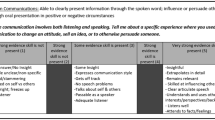Abstract
Objective: To study residents’ perceptions of their responsibility for patients, the quality of patient care, and their learning experiences in light of new work-hour regulations.
Design: Inductive analysis of in-depth, semistructured, recorded interviews with a cohort of interns in internal medicine in the last month of their first postgraduate year. Questions were grounded in an examination of issues related to going off duty and delegating tasks to colleagues. Transcripts were independently analyzed by an interdisciplinary team.
Setting: New York University/Bellevue Hospital Center’s residency program in internal medicine (in New York City).
Participants: A cohort of 21 of a possible 24 interns in medicine on rotation at Bellevue Hospital Center.
Results: The interviews revealed: 1) intense concern harbored by interns for their patients with resulting difficulty in maintaining realistic boundaries between work and personal lives; 2) an open-ended workday and competing considerations confronting interns when deciding to leave the hospital — including concerns about leaving patients at critical junctures in their care, confidence in the colleague to whom they were signing out, regard for the workload of this colleague, and uneasiness about the educational consequences; 3) deterrents to acknowledging and acting on one’s limits in performing medical work; and 4) a recurrent conflict between delegating responsibility and retaining control over patient care.
Conclusion: Values traditionally learned in training emphasize autonomy and individual accountability. They may conflict with the shared decision making and collective responsibility among peers necessitated by work-hour limitations and associated changes in program structure.
Similar content being viewed by others
References
Wallerstein SJ, Rosner F, Wallace EZ. House staff stress. N Y State J Med. 1989;89:454–7.
McCall TB. The impact of long working hours on resident physicians. N Engl J Med. 1988;318:775–8.
Levin R. Beyond “The Men of Steel” — the origins and significance of house staff training stress. Gen Hosp Psychiatry. 1988;10:114–21.
Schwartz AJ, Black ER, Goldstein MG, Jozefowicz RF, Emmings FG. Levels and causes of stress among residents. J Med Educ. 1987;62:744–53.
Colford JM, McPhee SJ. The ravelled sleeve of care—managing the stresses of residency training. JAMA. 1989;261:889–93.
Hoekelman RA. Stress experienced during pediatric residency training—its causes, consequences, recognition, and solutions. Am J Dis Child. 1989;143:177–80.
Butterfield PS. The stresses of residency—a review of the literature. Arch Intern Med. 1988;148:1428–35.
Martin AR. Stress in residency: a challenge to personal growth. J Gen Intern Med. 1986;l:252–7.
McCue JD. The distress of internship. N Engl J Med. 1985;312:449–52.
Samkoff JS, Jacques CHM. A review of studies concerning effects of sleep deprivation and fatigue on residents’ performance. Acad Med. 1991;66:687–93.
Bell BM. Evolutionary imperatives, quiet revolutions: changing working conditions and supervision of house officers. Pharos. 1989;52:16–9.
Reiner SC. The impact of the new code regulations on postgraduate medical education in New York State. N Y State J Med. 1989;89:457–61.
Asch DA, Parker RM. The Libby Zion case: one step forward or two steps backward? N Engl J Med. 1988;318:771–5.
Cohen MI, Dancis J, Finberg L, Hirschhorn K, Katz M, Wasserman E. Patient care, resident stress, and government regulation. Am J Dis Child. 1989;143:181–2.
Glickman RM. House-staff training—the need for careful reform. N Engl J Med. 1989;318:780–2.
Cousins N. Internship: preparation or hazing? JAMA. 1981;245:377.
Internship: physicians respond to Norman Cousins. JAMA. 1981;246:2141–3.
Cousins N. Norman Cousins responds. JAMA. 1981;246:2144.
Stein S. Regulation of residency training in New York State: implications for other states. Hosp Community Psychiatry 1990;41:273–5.
American College of Physicians. Working conditions and supervision for residents in internal medicine programs: recommendations. Ann Intern Med. 1989;110:657–63.
Petersdorf RG, Bentley J. Residents’ hours and supervision. Acad Med. 1989;64:175–81.
Merton RK, Reader GG, Kendall PC (eds). The Student Physician: Introductory Studies in the Sociology of Medical Education. Cambridge, MA: Harvard University Press, 1957.
Fox R. Training for uncertainty. In: Merton RK, Reader GG, Kendall PC (eds). The Student Physician: Introductory Studies in the Sociology of Medical Education. Cambridge, MA: Harvard University Press, 1957;207–41.
Light D. Uncertainty and control in professional training. J Health Soc Behav. 1979;20:310–22.
Becker HS, Geer B, Hughes E, Strauss AL. Boys in White: Student Culture in Medical School. Chicago: University of Chicago Press, 1961.
Bucher R, Stelling JG. Becoming Professional. Beverly Hills, CA: Sage Publications, 1977.
Mumford E. Interns: From Students to Physicians. Cambridge, MA: Harvard University Press, 1970.
Bosk C. Forgive and Remember. Chicago: University of Chicago Press, 1979.
Bloom SW. Structure and ideology in medical education: an analysis of resistance to change. J Health Soc Behav. 1988;29:294–306.
Mizrahi T. Getting Rid of Patients: Contradictions in the Socialization of Physicians. New Brunswick, NJ: Rutgers University Press, 1986.
Lofland J. Analyzing Social Settings. Belmont, CA: Wadsworth Publishing Company, 1971.
Inui TS, Frankel RM. Evaluating the quality of qualitative research. J Gen Intern Med. 1991;6:485–6.
Heimbach D. Why the clinical clerkship? A statement to students. Pharos. 1976;39:103–5.
Stelling J, Bucher R. Vocabularies of realism in professional socialization. Soc Sci Med. 1973;7:661–75.
Sharaf MR, Levinson DJ. The quest for omnipotence in professional training — the case of the psychiatric resident. Psychiatry. 1964;27:135–49.
Levy L. Factors which facilitate or impede transfer of medical functions from physicians to paramedical personnel. J Health Hum Behav. 1966;7:52.
Stein LI. The doctor-nurse game. Arch Gen Psychiatry. 1967;16:699–703.
Malmsheimer R. Doctors Only—The Evolving Image of the American Physician. New York: Greenwood Press, 1988.
Wu AW, Folkman S, McPhee SJ, Lo B. Do house officers learn from their mistakes? JAMA. 1991;265:2089–94.
Mizrahi T. Managing medical mistakes: ideology, insularity and accountability among internists-in-training. Soc Sci Med. 1984;19:135–46.
Author information
Authors and Affiliations
Additional information
Supported by a grant from the Zlinkoff Foundation, Providence, Rhode Island.
Rights and permissions
About this article
Cite this article
Yedidia, M.J., Lipkin, M., Schwartz, M.D. et al. Doctors as workers. J Gen Intern Med 8, 429–435 (1993). https://doi.org/10.1007/BF02599620
Issue Date:
DOI: https://doi.org/10.1007/BF02599620




